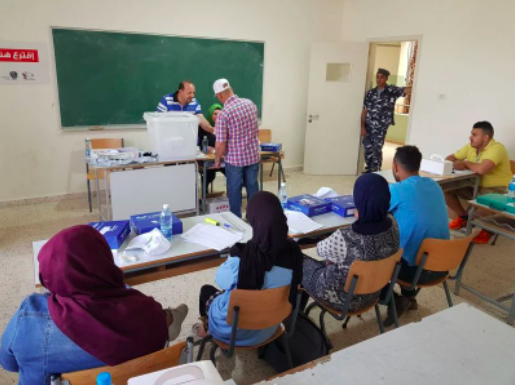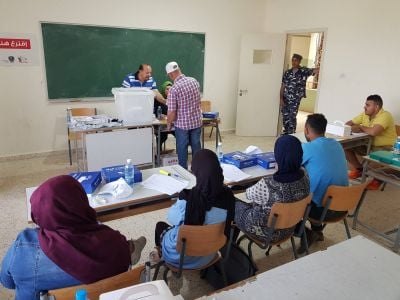
A polling station in Berkayel, Akkar, during the legislative elections of May 2018. (Credit: Michel Hallak/L'Orient Today)
Long considered as a reservoir for Sunni votes and one of the strongholds of the Future Movement, the North I constituency (Akkar) is preparing for the elections differently from the rest of the districts, with Saad Hariri’s party having decided not to enter the fray.
Certainly, and unlike other constituencies with a Sunni majority, the main Hariri figures in the area are running as independents.
But, appearances should not be taken for granted.
The absence of the biggest political player in the North I constituency is reshuffling the cards, and all the players intend to take advantage of it, both traditional candidates and newcomers.
Competing groups
The old candidates are here to stay.
In this constituency where seven seats are to be filled (3 Sunni, 2 Greek Orthodox, 1 Maronite, 1 Alawite), voters will not be disoriented on May 15, despite Hariri’s withdrawal from political life.
Three out of four Haririst MPs are running again: Hadi Hobeiche, Walid Baarini and Mohamad Sleiman have formed a list with independent politicians.
Only MP Tarek Merhebi chose to comply with the decision of the Future Movement leader, leaving the place to his father. The latter joined Samir Geagea’s Lebanese Forces, which presented a list in alliance with local Sunni figures.
As for the main rival of the LF on the Christian scene: the Free Patriotic Movement. It joined forces with Rabih Banat, leader of the National Syrian Social Party (SNSP), which is hostile to the former SSNP party leader Assaad Hardan. The party’s branch loyal to the latter has not managed to field its two candidates onto a list.
Prime Minister Najib Mikati also supports a list, whose central candidate is Haitham Ezzeddine.
Bahaa Hariri, Saad Hariri’s older brother, who launched a few months ago the activities of his political movement Sawa li Lubnan from Akkar, is also sponsoring a list.
As for the protest movements, they are split into three lists and therefore seem to have little chance of making a breakthrough.
2018 vs 2022
Although Hariri’s candidates are the same, this year’s battle appears to be different from 2018.
Several Sunni politicians seem to want to take advantage of Hariri's absence to consolidate an alternative Sunni leadership.
First, Mikati, whose electoral ambitions were previously confined to the city of Tripoli, is supporting a list in Akkar for the first time, via the head of Azm (the Prime Minister's party) in the district, Haytham Ezzeddine.
Bahaa Hariri, a fierce opponent of Hezbollah, is also sponsoring a list for the first time.
But Saad Hariri's absence goes far beyond the Sunni issue.
On the Christian side, the LF is deprived of its main ally, as the former Future Movement MPs who are standing for re-election did not want to repeat their 2018 alliance with Geagea's party.
The latter, however, relies on new Sunni allies: Two former MPs of Hariri’s parliamentary bloc, Khaled Daher, known for his Islamist positions, and Talal Merhebi, a traditional figure of Akkar.
The FPM will also have to fight the battle without a Sunni ally.
While in 2018, the Aounists had allied themselves with Al-Jamaa al-Islamiya (the Islamic Group), the latter decided not to participate in the election this time in Akkar.
Mohammad Chadid, candidate of the Islamist Group in 2018, secured 5,277 votes.
The Marada Movement of Sleiman Frangieh, an influential party in North Lebanon, whose candidate in 2018, Karim Rassi, garnered 2,590 votes, is also not entering the fray.
As for the Alawite seat, occupied in 2018 by Mustapha Hussein (who received about 1,500 votes), it does not seem to be coveted by any heavyweight player.
The identity of the winner will probably depend on the game of electoral coefficients.
What’s at stake
The seats of the Hariri bloc: some 70,000 votes, or more than half of the votes cast.
This was the electoral weight of the Future Movement in the 2018 elections.
The Future Movement and its allies managed at the time to retain five seats (three Sunni, one Maronite and one Greek Orthodox) out of a total of seven, including one elected from the LF.
Following Saad Hariri's decision to boycott the May elections, it is unclear whether the list formed by the outgoing Hariri MPs, who are standing for re-election this time on other parties tickets, will be able to re-mobilize this electorate, especially in light of the significant risk of abstention.
These three MPs obtained a significant number of votes in 2018: 20,246 votes, more than the electoral threshold, for Baarini (Sunni); 14,911 for Sleiman (Sunni); and 13,055 for Hobeiche (Maronite).
Their re-election is made all the easier by the important role played by traditional political families in Akkar. Baarini and Hobeiche both come from these families of notables with considerable weight in the area.
L’Orient-Le Jour learned from corroborating sources that the Future Movement is working with its “electoral keys” in the area to make sure that Hobeich snatches the Maronite seat against the FPM candidate Jimmy Jabbour (8,667 votes in 2018).
When contacted, the Future Movement’s spokesman Abdel Salam Moussa denied these claims.
But while the re-election of the three Hariri MPs seems to be a foregone conclusion, what is really at stake is the third Sunni seat, previously held by Future Bloc member Merhebi (14,145 votes in 2018).
Without the explicit support of Saad Hariri, the list may have difficulty electing a fourth MP (other than the two Sunnis and the Maronite).
So, who will succeed Merhebi? His own father, former MP Talal Merhebi, is a strong candidate, as the Merhebi family is one of the largest in the area.
Although he has spent most of his political career with the Hariri family, he is a candidate on the list supported by the LF. But the Christian party — whose relations with the Future Movement are currently strained — is not the only one seeking to take advantage of Hariri's absence.
Mikati, who has been rallied by Khaled Taha, former head of the Future Movement in the area, could also win the third Sunni seat at stake.
Another player is to be taken into consideration and who could tip the balance: Al-Jamaa al-Islamiya, which has a large pool of votes and has not yet supported any candidate, according to L’Orient-Le Jour’s correspondent in Akkar.
The FPM-LF battle: Will Geagea’s party manage to win in this constituency where the large Christian minority leans more towards the FPM?
In 2018, Wehbe Qaticha, the LF candidate, managed to secure only 7,911 of the votes, far below the electoral threshold (19,059 votes).
According to a study by the Lebanese Center for Policy Studies, about a third of those votes came from Sunni polling stations. So, the LF could lose its only seat without Sunni support.
On the other side of the spectrum, the FPM seems more comfortable: in 2018, Gebran Bassil’s party obtained three times more votes in Akkar than the LF (the FPM-led list won two seats, one Greek Orthodox and the other Alawite).
A battle will therefore be played at the level of the two Greek Orthodox seats between, on the one hand, FPM candidate Assaad Dergham (7,435 votes in 2018) and his running mate Chakib Abboud, candidate of the pro-Syrian SSNP (5,000 votes in 2018) which could take advantage of the considerable influence of Damascus in this bordering area, and LF candidate Wissam Mansour, on the other.
The FPM and its allies could also benefit from the support of Hezbollah, which, despite a very small Shiite presence in the area, has been trying for several months to deploy a clientelist network in this peripheral area that remains extremely poor and marginalized.
In August, after the explosion of an illegal gasoline tank in Tleil that killed some 30 people, Hezbollah distributed substantial financial aid to the families of the victims.
At the time, the Party of God denied any political motive, causing the Future Movement to grind its teeth.
Hezbollah’s aid distribution was immediately followed by an American visit to Hariri MPs in the area.
Technical data
One district: Akkar.
Seven seats to be filled: 3 Sunni, 2 Greek Orthodox, 1 Maronite, 1 Alawite.
Number of registered voters: 309,083, including 8,415 expatriates.
Confessional distribution of voters: 69 percent Sunni, 13 percent Greek Orthodox, 10 percent Maronite, 5 percent Alawite, 1 percent Shia, 1 percent Greek Catholic, 1 percent other (according to Interior Ministry’ figures).
Electoral threshold (in 2018): 14.28 percent of the vote, or 19,059 votes.
Competing lists
1- Awakening for Akkar: supported by Sawa li Lubnan of Bahaa Hariri.
Nafez Waraq, Haitham Chebib, Mahmoud Hadara, Mohammad Ahmad Hussein, Saadallah Hamad, Tanios Khoury, Wassim Meraabi.
2- Loyalty to Akkar: supported by Najib Mikati.
Ahmad Hadam, Ali Tleiss, Ammar Rashid, Elie Saad, Elie Dib, Haitham Ezzeddine, Joseph Mikhael
3- The List of Akkar: supported by the LF and independent personalities.
Fawaz Mohamad, Khaled Mohammad Daher, Michel Khoury, Mohamad Ibrahim, Talal Merhebi, Wissam Mansour, Ziad Rahal.
4- Akkar the Change: supported by protest movement groups
Barri el-Assaad, Edgar Dagher, Jinane Hamdan, Khaled Alloush, Loris Rai, Mohamad Badra, Wafa Jamil (withdraw from the race).
5- Akkar First: supported by the FPM + SSNP (Rabih Banat group).
Asaad Dergham, Chakib Abboud, Haidar Issa, Hatem Saadeddine, Jimmy Jabbour, Karam Daher, Mohamad Yehya.
6- Akkar Revolts: supported by protest movement groups.
Abdelrazak Kilani, Khaled Daher, Muhammad Musulmani, Nizar Ibrahim, Reine Sawan.
7- Towards Citizenship: supported by Citizens in a State (by Charbel Nahas) + the Communist Party.
Ahmad Mustafa, Ghaith Mahmoud, Michel Taoum, Nazih Ibrahim, Ralph Daher, Roula Mrad.
8- National Moderation: supported by former Harirists.
Ahmad Rustom, Hadi Hobeiche, Ibrahim Maasoumi, Julie Hanna, Mohamad Sleiman, Sagih Attieh, Walid Baarini.
